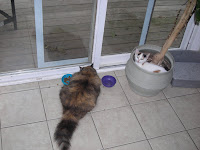Lairnin an' Such
I've lost track of the exact sequence of events that got me into playing music. My daughter was taking violin lessons for a short while several years ago--is that what prompted my father to send her back with a short-scaled mandolin, or was it the other way around? It is for sure what started my wife's sporadic interest in the fiddle, as she tried to show Junior some of the practice moves. Regardless, that neglected little mandolin (yeah, I think it showed up a good year before the fiddles) proved infectious, and to this day I have no idea why. I played a trumpet in high school, and it took as poorly as the kids' violin lessons did. Maybe it just took thirty-plus years to grow the proper mindset. (I should be great when I'm 80.)
I'm not an overbearing music parent (or husband), and aside from the little brown lute, the efforts come and go around me. Far from overbearing: if the girl's not interested, then I can't see the point of springing the funds that could otherwise help inch the family out from our crushing mountain of debt. Private music lessons don't come cheap. Learning through school is covered by your taxes though (there may be a libertarian anecdote in this one), and through those channels, the rented kid's fiddle has been replaced with a rented (full-size) trombone after a merciful two-year hiatus.  The bias of school music programs toward wind instruments is a mystery to me, really. My current theory is that it's an insidious scheme by The Man to completely dissociate music from sex (the emasculating band uniforms I remember from high school would support this), in which case, my daughter's going to remain unmolested if she manages to drag that ridiculous trombone around until she goes to college. ('You know, I have a trumpet,' I tell her, 'it's a lot easier to take on the bus.' 'Daddy!')
The bias of school music programs toward wind instruments is a mystery to me, really. My current theory is that it's an insidious scheme by The Man to completely dissociate music from sex (the emasculating band uniforms I remember from high school would support this), in which case, my daughter's going to remain unmolested if she manages to drag that ridiculous trombone around until she goes to college. ('You know, I have a trumpet,' I tell her, 'it's a lot easier to take on the bus.' 'Daddy!')
Of course I had to try it when she brought it home, and I can't say whether it's with pleasure or disappointment that I observe my hatred of brass instruments holds. They seem like they should be my thing, all about the mouthfeel, but before you can start slobbering lasciviously into one of those, you have to learn to clamp your cheeks (your embrochure) vise-like to even get the first fraction of the available notes. (I think it also helps to have an appropriately shaped mouth.) That was a frustrating thing--you need some stern measure of discipline to even find most of the damn notes, never mind to play them well. Even though I've been clenching my jaw for about a year straight, I still could only come up with hissing farts on Junior's trombone. The visual/aural/tactile combination of a stringed instrument has, to my surprise, suited me much better.
The other frustrating thing with the old trumpet was just my basic laziness. I didn't want to learn it badly enough to actually learn it, and it didn't come nearly as effortlessly as the schoolwork. It's funny what you value. My wife has had no time for fiddling since she started taking classes this fall. She's busy relearning chemistry for the biomedical field, and this time around she's fascinated with it all. She's taking notes and studying hard, not to get through it, but because she's paying the cash and wants to learn what she's paying for. Also because it interests her. It's great to see her this excited. When you're learning because you want to, you can get a sort of positive reinforcement going. When you feel obligated, the knowledge can still get in there, but it's not treasured. In my case, this has been the difference between the tiny handful of good projects at my job and the innumberable shitty ones (that have been better spent blogging).  I've been an autodidactic menace on the mandolin for more than three years now, and, as I've been saying, cruising along a low-grade upward spiral of interest and accomplishment. Which isn't to say I don't suck--I'm atrocious--but I'm at the point where some pointed advice, advice about where to focus, some tools and tips, would be highly valued. I landed in music lessons by another odd sequence of family events. My wife ran into a mandolin player at a wedding and cornered the guy by the bathroom. (My wife's tactlessness makes up well for my shyness--we work great this way, except when we infuriate one another.) I may be terrible, but this guy is an ace--I really love his fusion thing. (And I'm sure he won't mind the plug.) At fifty bucks, I'd better value the lesson, but even one visit is pointing me in some of the directions I was too puzzled to find. I'll write about that soon, I think (this post is a boring introduction to that one that flowed over the wall), but it feels good to be gaining knowledge without pressure, for no other reason than because it satisifies me.
I've been an autodidactic menace on the mandolin for more than three years now, and, as I've been saying, cruising along a low-grade upward spiral of interest and accomplishment. Which isn't to say I don't suck--I'm atrocious--but I'm at the point where some pointed advice, advice about where to focus, some tools and tips, would be highly valued. I landed in music lessons by another odd sequence of family events. My wife ran into a mandolin player at a wedding and cornered the guy by the bathroom. (My wife's tactlessness makes up well for my shyness--we work great this way, except when we infuriate one another.) I may be terrible, but this guy is an ace--I really love his fusion thing. (And I'm sure he won't mind the plug.) At fifty bucks, I'd better value the lesson, but even one visit is pointing me in some of the directions I was too puzzled to find. I'll write about that soon, I think (this post is a boring introduction to that one that flowed over the wall), but it feels good to be gaining knowledge without pressure, for no other reason than because it satisifies me.
Keifus (with apologies to the usual gang of idiots)





 Hecklers make the best storybook heroes. Yeah, you have your square-jawed types, your wise daddy deities, your fecund fertility goddesses, but wisdom and power--even stupidity--will only get you so far if there's no one to tell the story. The tricksters in the pantheon: the Monkeys, the Coyotes, even the Lokis are the ones who keep it interesting, poke the holes in seats of divine authority. Even if Jesus saw fit to nudge the occasional Pharissee, Judeo-Christian mythology evoloved to be such a dour faith, it requred a secular culture to knock The Old Man down every now and then. From a modern version of that secular effort, Tex Avery and
Hecklers make the best storybook heroes. Yeah, you have your square-jawed types, your wise daddy deities, your fecund fertility goddesses, but wisdom and power--even stupidity--will only get you so far if there's no one to tell the story. The tricksters in the pantheon: the Monkeys, the Coyotes, even the Lokis are the ones who keep it interesting, poke the holes in seats of divine authority. Even if Jesus saw fit to nudge the occasional Pharissee, Judeo-Christian mythology evoloved to be such a dour faith, it requred a secular culture to knock The Old Man down every now and then. From a modern version of that secular effort, Tex Avery and 







